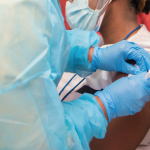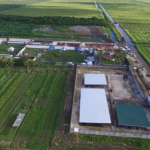
Guyana’s Minister of Health, Dr. George Norton believes there should be increased access to HIV prevention and care services within the prison system.
The prison population in Guyana continues to see a rise in HIV cases.
Speaking at the UNAIDS 37th Programme Coordinating Board Meeting in Geneva on Tuesday Dr. Norton said, “I wish to state in advance that I am in full support of accelerating an increased access to HIV prevention, treatment and care services for people in prisons and other closed settings. Whist we are all aware of the risk for HIV in prisons and closed settings, our response in many ways have been lagging and therefore the time is opportune that we prioritise this population.”
He added that “this means therefore that at the national level there has to be willingness and openness of all stakeholders to collaborate and share information as possible. There has to be leadership from line Ministries such as Ministries of Security. Indeed, this brings to bear the concept of health in all policies.”
The Minister said the issue must be addressed in a hands on approach and should not be ignored.
“Access to HIV education and testing, the controversial condoms in prisons. The opponents of prevention services and more particularly condoms in prison must be educated and lobbied to ensure that there is full understanding of the issues and that decisions are based on evidence and science. Policies have to take on board a comprehensive, combination prevention approach to HIV.”
Norton said the prevalence of HIV infections in the prison system is two times higher than nationally and the issue ought to be addressed. He told the meeting that “in my own country, the prison population has an HIV prevalence of at least two times higher than that of the general population. Whist this may be the case in many other places, depending on how we see and approach this issue, these types of settings could present as ideal environments for HIV services. For example, prisoners who are HIV positive and on treatment could be monitored through Direct Observed Therapy (DOT). “
There are many challenges in rolling out programmes in these settings. In the majority of the cases, persons are ill prepared to exit and therefore ill prepared to integrate into their communities and society,” he added.
Further, the lack of knowledge and discontinuation of Anti Retroviral Treatment (ARV) is also a major contributing factor in the high rates of HIV in these systems. “Persons are entering their communities with limited knowledge on HIV prevention and indeed persons started on ARV treatment in the prison setting are far too often lost to follow up. This gap is significant and the implications are far reaching,” Minister Norton pointed out.
With regards to tuberculosis, the Public Health Minister highlighted that, “TB programmes in many cases have done well in prison settings. Moreover in the last decade or so, there has been strengthening, several folds, with the investments from the Global Fund. Many good lessons and best practices are available to us in this regard. More importantly, this is a real opportunity for us to all take the comparative advantage of established TB programmes in creating synergies and better efficiency in dealing with the HIV epidemic….persons in a prison setting deserve the same access to services as anyone would.”












You must be logged in to post a comment Login